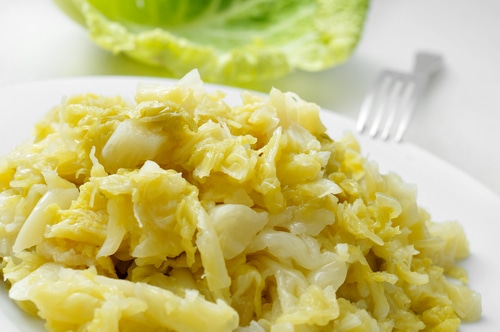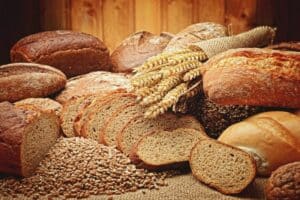Have you ever been a little ambitious with your cabbage cooking? Maybe it was on sale at the farmer’s market, and you simply couldn’t resist. Or perhaps you plucked more than a few of these succulent spheres from your garden’s harvest.
No matter what the reason is, excess cabbage probably has you wondering: can I freeze these leafy greens?
After all, you’d hate to waste such a nutrient-packed vegetable. Cabbages are full of A, B, and K vitamins. And cooked (or raw), they taste phenomenal. Yet, most leafy greens seem to suffer in the freezer.
So, can you freeze cooked cabbage? Could this cruciferous vegetable be the exception to the norm?
Below we have the answer to all your cooked cabbage freezing questions. Read on to learn whether you can, whether you should, and how you would freeze cooked cabbage.
Related Article: Can You Freeze Lettuce?
Can You Freeze Cooked Cabbage?

Yes, you can freeze cooked cabbage. In truth, you can freeze just about any vegetable, but the results aren’t always stellar.
The question is, does cooked cabbage freeze well? The answer to that is yes, too! Freezing cooked cabbage of any type is a great idea. There’s almost no discernable difference in texture or taste when it thaws.
You can freeze cooked green cabbage, red cabbage, savoy cabbage, or Bok Choy.
You should never freeze raw cabbage, though. Raw cabbage is full of fiber, and it has a high water content. Together, that means raw cabbage will turn to mush if you freeze it.
Cook or blanch your cabbage first and then freeze it; the results will be much better. In fact, if you blanch your cabbage first, you can freeze it and then use it in raw preparations, like salads and coleslaws.
Blanching simply means scalding the cabbage in boiling water for a short period. With cabbage, it takes about ninety seconds. After that, you place the cabbage in an ice bath to cool it rapidly. Then, you can flash freeze the cabbage leaves by laying them out on a sheet pan and sticking them in the freezer for an hour or two.
Once the leaves are flash-frozen, you can continue freezing using the steps below, beginning with step two.
How to Freeze Cooked Cabbage
Now that you know it’s possible let’s go over the basic steps. Freezing cooked cabbage is a straightforward process.
The first step is obviously to cook your cabbage. You can fry it, steam it, or blanch it (which we outlined above.) From there:
Let the Cabbage Cool
If you throw your cooked cabbage in the freezer while it’s hot or even warm, you could raise the temperature of your freezer, which could cause other frozen items to begin defrosting.
Worse still, warm cabbage will take forever to freeze. If it takes too long, bacteria can begin breeding, which is a significant problem. No one wants a food-borne illness from frozen cooked cabbage!
If you don’t have time to let it cool on the counter, you can use an ice bath to speed things up. Place the cooked cabbage in a bowl. Then set that bowl inside a larger container filled with ice and water. The cabbage will cool down rapidly.
Wrap It
Air is the enemy when it comes to freezing food, so wrap your cabbage tightly! If you’re using plastic, make sure it’s of the freezer-safe variety. You can also use foil or freezer bags.
For a fool-proof method, wrap the cooked cabbage in plastic wrap, then wrap it in foil. The double-layers will keep the freezer burn away by eliminating airflow around your food.
Label It
You think you’re going to remember the foil brick inside your freezer is filled with cooked cabbage, but be honest; you won’t. Even if you somehow manage to remember, you probably won’t recall the date you froze it. Label the outside with a sharpie and save yourself the guessing game.
Freeze as Fast as Possible
The faster your food freezes, the better the quality will be. Freeze your cooked cabbage in small portions if possible. They’ll freeze faster and are typically more convenient to use.
To Thaw or Not to Thaw
Once your cabbage is frozen, there’s one more question to consider. Should you thaw your cooked cabbage before you use it?
The answer is usually no. Typically, you’ll use cooked cabbage in soups, stews, or casseroles. In preparations like that, there’s no need to thaw your cabbage before you use it. It’ll thaw as the dish cooks without diminishing the dish’s quality or texture.
How Long Will Cooked Cabbage Last In The Fridge/Freezer?
Now that you’ve filled your freezer with cooked cabbage, you might be wondering, how long is cooked cabbage good for?
Cooked cabbage will last in the freezer for at least nine months with no discernible change in quality, giving you plenty of time to use it.
Technically speaking, you can keep cooked cabbage in the freezer for up to 12 months, but you’ll notice the quality begins to break down. After 12 months, it’s still safe to eat, but it might have a strange texture.
If you want top-quality frozen cooked cabbage that lasts a full 14 months without a change in quality, you can try using a vacuum-sealed bag for freezing.
Vacuum-sealing keeps air out, and air causes oxidation. Oxidation in frozen foods means freezer burn. Freezer burn isn’t harmful healthwise, but it messes with food’s texture. So, a vacuum-sealed bag is the best way to freeze food for long periods.
Should you choose to thaw your cooked cabbage, it will last covered in the fridge for another three days. After that, it’s time to throw it away.
How to Tell If Your Frozen Cooked Cabbage Is Bad
When you consider how long you can keep cooked cabbage in the fridge without freezing (3-5 days at most), frozen cabbage’s shelf life seems unreal. That doesn’t mean it can’t go bad, though.
If you notice any foul smells or off-coloring, you should throw the cabbage away. Don’t bother to taste it; it’s not worth the potential stomach ache!
It shouldn’t go bad in the freezer from a health standpoint because microbes can’t colonize in such cold temperatures. However, your cooked cabbage could have been starting to spoil before you froze it. Or, it could go bad after thawing.
Cold temperatures don’t kill bacteria; they only render them inactive. So, if your cooked cabbage was going bad before you froze it, the bacteria will activate as your cabbage warms up.
It’s essential, then, to only freeze cabbage that’s freshly cooked. Don’t freeze it, to begin with, if you notice yellowing, bad smells, or other signs of spoilage.
Bacteria can also begin to colonize during thawing if your cabbage gets too warm. Most recipes using frozen cooked cabbage won’t require you to thaw the cabbage at all. If you do need to, or decide to, make sure you do so in the fridge.
Sometimes people choose to thaw frozen cabbage on their kitchen counters. The risk, though, is that bacteria thrive in temperatures over 40 degrees Fahrenheit. It takes time for bacteria to populate, but if you leave your thawing cabbage at room temperature for too long, you could run into a problem. Bacteria lead to food-borne illnesses that are potentially very serious.
What to Do With Frozen Cooked Cabbage
Frozen cooked cabbage is a dream in soups and casseroles. You don’t even need to thaw it! Pull it straight from the freezer and throw it in a soupe aux choux (that’s French for cabbage soup). Or, toss it in a stuffed cabbage casserole, along with tomatoes and melted cheese!
If you happened to freeze whole, blanched cabbage leaves, they work great for cabbage rolls! You’ll need to thaw them first, though. Place them in the fridge overnight, and be sure to skip any blanching steps in your cabbage roll recipe. Your cabbage leaves will already be flexible and ready for rolling.
You could also throw your cooked cabbage in with other dishes. It’s fantastic alongside pierogi or mixed into fried rice. You could add it to goulash or even mix it into mashed potatoes to create colcannon, an Irish classic.
Of course, you could also eat it on its own. Seasoned with salt and garlic, cooked cabbage can be delightful.
Final Thoughts
So, can you freeze cooked cabbage?
The answer is a resounding yes! Cooked cabbage is perfect for freezing and will last a long time that way. If you use a vacuum-sealed bag, you could enjoy your cooked cabbage for up to 14 months after you freeze it!
Plus, thawing is usually optional. Frozen cooked cabbage can go straight from the freezer to your soup pot. It also does well in casseroles or tossed in with mashed potatoes or rice. If you do want to thaw it, simply place the cabbage in your fridge overnight. It’s that simple!
Not only can you freeze cooked cabbage, but we think you should. Don’t let extra cabbage go to waste; freeze it instead. When it comes time to make a casserole or soup, you’ll be glad you did!






